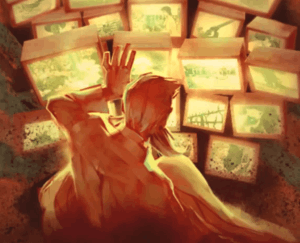Old Media Are Evil
"You provide the prose poems, I'll provide the war."
In the real world, newspapers, network television stations and other bastions of old media have complicated relationships with the Internet. They have sometimes been hostile to it, while also desperately embracing it in pursuit of new revenue streams in these difficult days. The New York Times's website is one of the most popular in the world, and quite a lot of commentators have Twitter feeds.
But this relationship is sometimes too complicated for a full and accurate portrayal in fiction. And thus we have the polar opposite of New Media Are Evil. Many works portray old media institutions (newspapers, radio, TV networks) as ignorant, malicious or both. The classic example of this trope is the stodgy old white guy railing against bloggers, webcomics, and anyone not under the influence of the brainwashing satellites owned by Louis Cypher, S. Atan, and Rupert Murdoch. Expect "get off my lawn"-type comments to come up rather frequently.
The reality? Most reporters, editors or other practitioners of old media are generally decent folk who do their jobs. They're no different from your typical insurance adjuster or other office mook. Because their jobs involve extensive public communication, mistakes tend to get amplified. If a reporter just broke up with a significant other and comes in bitter and angry and lets it affect his or her work, or simply makes an understandable mistake in spelling, an eagle-eyed reader will notice it. And as those mistakes are in the public eye, they can result in some innocent citizen getting burned on the front page. Media personnel usually receive extensive ethics training and take mistakes very hard. None of that makes the burned individual feel any better about getting humiliated in their local paper.
There is also a bit of an idea that older media institutions, due to being run by large centralized organizations, are prone to being taken over by corrupt and/or tyrannical governments and used as propaganda mills. While the internet still has a bit of a "rebel" feel to many people.
One of the ways authors allow certain members of old media institutions to Pet the Dog is to show them embracing the new media, especially in contrast to their less tolerant bosses and co-workers. Interestingly, this trope is actually Older Than They Think; people have been making jokes about how lame books are for a long time.
Meta note: a lot of Tropers have a lot of problems with old media figures, and often for good reason. That said, there are numerous pages on this Wiki devoted to chronicling the foibles of newspapers, TV, radio, etc. See: Media Research Failure, New Media Are Evil, The New Rock and Roll, among others. So please avoid placing any kind of "Truth in Television" examples on this page.
Film
- Citizen Kane is one of the earliest criticisms of Old Media in the form that it exists today. Note that Kane himself is a thinly veiled version of William Randolph Hearst—the spiritual godfather of Ted Turner and Rupert Murdoch. Keep in mind that Welles did slip in some delicious multi-level irony with the quote, "Don't believe everything you hear on the radio!".
- The Ring uses this heavily. An old videotape spreads an unending curse. Bonus points go to the Western Film version, which discuss it.
What is it with you reporters? You take one person's tragedy and force the world to experience it. You spread it like a sickness.
Live Action TV
- iCarly did an episode where the kids' webshow is bought up by a network—and Executive Meddling quickly turns it into something completely different (and much more childish).
- A Buffy the Vampire Slayer episode has a zealous computer student snarling "The printed page is obsolete!"—Giles recoils as if startled by an odd bug. Computer teacher Ms. Calendar seems little better as she accuses Giles of wanting knowledge kept "in some depository where only a handful of white guys can get at it!"
Newspaper Comics
- Candorville anthropomorphizes the "Mainstream Media" as a loud, fat man who usually tells the whole truth, but whose most unnerving or sensationalistic statements are written in bigger lettering. Then again, "The Internet" is naked except for a tinfoil cap and thinks shaking hands transmits Alzheimer's.
Video Games
- In Trenched, television is invented early in World War I, by the Big Bad. Seeing the horrors in the world brought to his home, combined with how crappy the primitive programming was, drove him to insanity.
- In Ghostbusters: The Video Game, Egon and Ray have repeatedly expressed that they wished Print Was Dead because of all the Tomes Of Eldritch Lore and ghost possessed books.
- The Binding of Isaac uses Body Horror and Christian mythological undertones inspired by conservative Christian propaganda films and print media from The Eighties.
Web Comics
- Scott Kurtz and Newspaper Comics.
- While not exactly evil, An Arc in Least I Could Do involved Rayne buying a newspaper and took numerous potshots at Old Media.
Former Newspaper Owner: I was thinking of buying a radio station.
Rayne: Why do you hate money?
Western Animation
- The Simpsons, as usual, parodies this with an episode where Lisa discovers that all the books are gone from the library. The reason? Books are for squares!
- Invader Zim portrays television in an exclusively negative light in keeping with the Crapsack World. Just watch this commercial.
